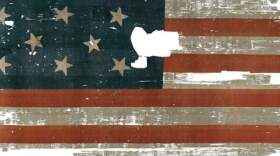-
From shutdown threats to debt ceiling showdowns, Washington has made high-stakes budget fights a familiar part of politics. David Thomson traces that pattern back to the 1840s, and explains what it can teach us about today’s budget battles.
-
Few people know the real story of "The Star-Spangled Banner," the flag that inspired the lyrics of the national anthem.
-
Two hundred fifty years ago this year, the United States was born. It was written into existence with the Declaration of Independence. A new work by journalist Walter Isaacson focuses on the power of one specific sentence in that historic document and how it shaped a new nation. WSHU’s Culture Critic Joan Baum read it and has this review.
-
A thrift store in Canada was selling a collection of antique rings and medallions for about 20 US dollars when it learned the jewelry was from ancient times.
-
Antarctic explorer Ernest Shackleton's crew famously survived after the Endurance became stuck in ice in 1915. A researcher says the ship was ill-equipped for the voyage and Shackleton was aware.
-
It took 10 years of work to prepare a Viking longship for a trip no longer than a football field. How it got to that spot goes back even further — over a millennium.
-
George E. Hardy was the youngest Red Tail fighter pilot at 19 years old and completed 21 missions across Europe during World War II.
-
WSHU's Ebong Udoma spoke with Sacred Heart University politics professor Gary Rose to discuss his new book, James Madison, Public Servant: A Biography, ahead of a Constitution Day talk on Madison’s enduring influence on American democracy.
-
NPR's Sacha Pfeiffer speaks with Tracy Slater, author of "Together in Manzanar," which tells the true story of a family of mixed heritage sent to a Japanese internment camp during World War II.
-
Carol Moseley Braun is no stranger to stepping into new territory. She was the first Black woman elected to the U.S. Senate now she shares that experience a new memoir.
Play Live Radio
Next Up:
0:00
0:00
Available On Air Stations










